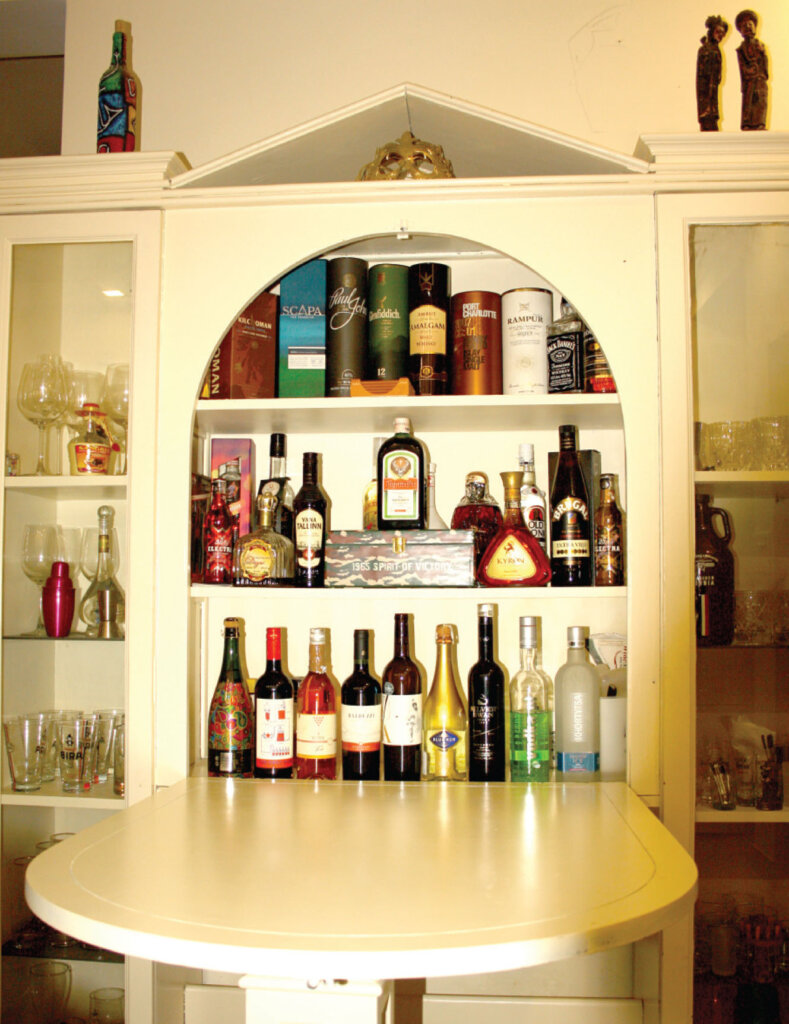Tipsy Laws on Storing Liquor at Home

If government law enforcement agencies go by the books, a good number of upper middle class & influential people of Delhi will be behind bars for possessing more liquor than the permissible limit.
In a chance raid by a law enforcement agency at the residence of a person living in one of the posh localities of Delhi led to a chance discovery of a huge ‘catch.’ They found a private pub, having a rich collection of foreign and Indian Made Foreign Liquor (IMFL), which was beyond the permissible limit of individual possession in Delhi
The agency concerned called in the Excise Officials who in turn alerted the local police station. The local police registered an FIR under section 33 (1) (f) of the Delhi Excise Act, 2009 for possession of intoxicants. This, they claimed was beyond the prescribed quantity which is given in Rule 20 of The Delhi Excise Rules, 2010.
The innocuous grand collection and display of various liquor bottles in the private bar inside one’s house has left that person high and dry as he is now facing prosecution and faces a possibility of conviction and a minimum period of imprisonment of six months which may extend to three years with fine. The fine may range between a minimum of Rs. 50,000 which may extend to Rs.1 lakh.
The Indian laws concerning the limit for individual possession of liquor at home are very complex and varied and there is no uniformity across the country in this regard. This is also because of the fact that alcohol is a subject in the State List of the Seventh Schedule of the Constitution of India, meaning thereby that each state has legislative power to legislate and enact its own laws, policies, rules and regulation inter alia allowing or restricting the production, trade, possession, etc. of liquor.
Archaic mindset
The Victorian, archaic and custodian mindset of our lawmakers, when it comes to production, trade, possession, etc. of liquor, is very obvious once we see how the various state governments have dealt with these issues in their respective Excise Acts, policies and rules framed there under. The United Province Excise Act of 1910 (applicable to the state of Uttar Pradesh, as amended from time to time) is a classic example to prove the archaic and custodian mindset of our lawmakers when it comes to liquor.
In most of India’s states and UTs, the consumption of liquor below the permissible age and possession of liquor beyond the permissible limit is a cognizable offence (a case in which a police officer may arrest without warrant), which gives tremendous power to the police officials and law enforcement agencies to take action against anyone who happens to store liquor at his/her house, even if for selfconsumption/consumption by his/her guest only and not for sale, or consumes liquor in bona fide belief that he/she can do so as he/she had been doing in his/ her home state legitimately.

State specific laws which put a cap on the limit of possession of liquor need urgent relook
In fact, at any given point of time, if search is being conducted at the residences of HNIs or whos who from the business or power circles or even in the flats of millennials, it is a foregone conclusion that the authorities will come across possession of liquor from many individuals which are much beyond the prescribed limit, depending upon the state concerned.
Differing limits
Again the cap for maximum limit for individual possession of liquor differs from state to state and UT to UT. In Delhi an individual of the age of 25 years or above (25 is the minimum legally permissible age for consuming liquor in Delhi) may legally possess nine litres of whisky, rum, gin, vodka and brandy & 18 litres of wine, beer, liquor, cider and alcopop. While in UP (say in Noida) an individual (of the age of 21 year, which is the legally permissible age in UP to consume alcoholic beverages, or more) cannot possesses beyond 1.5 litres of country made alcohol, 1.5 litres of India Made Foreign Liquor & four bottles of beer.
In these times, when there is almost no restriction on the movement of people, ideas and food across national borders, the artificial and archaic Indian state specific laws for possession of liquor need urgent relook and any law or rule which puts a cap on the limit of possession of liquor, if the same is legally purchased and stored in homes for private consumption, must be done away with.
In the meantime, creating awareness among the people in general by means of mass media and public display and announcement about possession of liquor at home (in that particular state) should be made mandatory at the vendors’ premises itself.
Delhi, being the capital and a city where people across the world come to work, stay and to visit as tourists, must take the lead among the states and UTs of the country and come up with amendments in the Excise Act, 2009 and the Excise Rules, 2010 firstly by doing away with the cap on the possession of liquor at home for personal consumption, to begin with.
(The author is the Founder & Managing Partner of Actus Legal Associates & Advocates, a bouquet law firm based in Delhi. He can be contacted at spiritzlegal@gmail.com)

